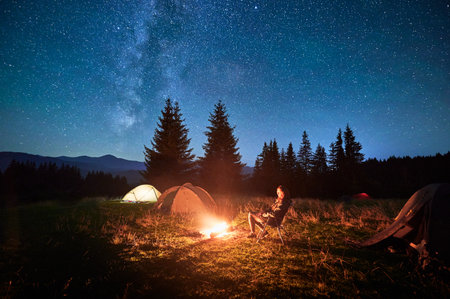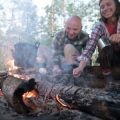Introduction to Wild Camping in the Lake District
Wild camping in the Lake District is a truly magical experience, inviting families and adventurers alike to escape the hustle and bustle of daily life and immerse themselves in nature’s embrace. Nestled in the heart of Cumbria, this iconic National Park boasts rolling hills, tranquil lakes, and rugged fells that have inspired generations of poets, artists, and explorers across Britain. For many in the UK, wild camping here isn’t just about pitching a tent; it’s about rekindling a sense of wonder, sharing laughter around a crackling campfire, and forging memories under star-filled skies. With its breathtaking landscapes and abundant wildlife, the Lake District offers an idyllic setting for families seeking quality time together—free from screens and schedules. Whether you’re seasoned campers or curious first-timers, exploring the Lake District through wild camping provides a unique opportunity to bond, learn new outdoor skills, and discover hidden corners off the beaten path. Join us as we delve into the rules, tips, and secret spots that make wild camping here such a cherished British adventure.
Understanding the Law: Rules and Regulations
Before you pack your rucksack and head for the fells, it’s essential to understand the legal side of wild camping in the Lake District. Unlike Scotland, where wild camping is largely permitted under the Scottish Outdoor Access Code, England’s rules are a little different. In England—and specifically in the Lake District National Park—wild camping is technically not allowed without the landowner’s permission. However, there is a long-standing tradition of responsible wild camping in remote areas, especially if you leave no trace and stay discreet.
Your Rights and Responsibilities
Caring for these beautiful landscapes goes hand-in-hand with enjoying them. The Lake District National Park Authority encourages all campers to follow a set of guidelines that protect nature and respect local communities. Here’s a gentle overview of what’s expected:
| Do | Don’t |
|---|---|
| Seek landowner permission if possible | Camp close to roads, buildings, or livestock |
| Camp high up on the fells, away from settlements | Light open fires (use a stove instead) |
| Pitch late and leave early | Leave any litter or damage natural features |
| Use a small tent (ideally two-person) | Disturb wildlife or play loud music |
| Leave no trace—take everything home with you | Stay more than one night in the same spot |
The Legal Essentials in the Lake District
If you’re hoping for an authentic wild camp experience in Cumbria’s hills, here are some important points to remember:
- No automatic right to camp: You must have explicit permission from the landowner unless you’re part of an organised event with special consent.
- National Trust land: Some areas managed by the National Trust tolerate discreet wild camping if you follow all guidelines—always check their website first.
- Lakeshore camping: Camping on the shores of popular lakes like Windermere and Ullswater is not allowed due to environmental concerns.
- Countryside Code: Respect everyone, protect the environment, and enjoy the outdoors responsibly.
Top Tip for Families:
If you’re introducing little ones to wild camping, make sure they understand why we look after these special places together. A little chat about ‘leaving no trace’ can turn every outdoor adventure into a positive learning experience!

Top Tips for Family-Friendly Wild Camping
Heading out for a wild camping adventure in the Lake District with your children is a brilliant way to make lasting memories, but it does require some thoughtful preparation. Here are some practical, UK-centric tips to ensure your family enjoys a safe and comfortable experience while respecting the stunning natural surroundings.
Packing Essentials for Families
When packing, less is more, but don’t skimp on the essentials. Choose lightweight tents and sleeping bags suitable for the unpredictable British weather. Pack extra layers—think waterproofs, fleeces, and wellies—to keep everyone warm and dry. Bring plenty of snacks and easy-to-cook meals that little ones will love, plus a compact first aid kit. Don’t forget head torches, spare batteries, and favourite soft toys for bedtime comfort.
Weather Preparation: Expect All Four Seasons
The Lake District is known for its changeable weather—even in summer! Always check the local forecast before setting off and prepare for rain or shine. Teach your children about layering clothes so they can easily adapt to temperature changes. Have sturdy boots ready for muddy trails, and bring quick-dry towels to handle any unexpected showers or paddling adventures.
Leave No Trace: Protecting Nature Together
One of the most important lessons for young campers is how to care for the beautiful landscapes around them. Follow Leave No Trace principles by carrying out all rubbish, using biodegradable soap at least 30 metres from water sources, and avoiding campfires unless using a raised fire pit with landowner permission. Encourage children to spot local wildlife without disturbing them and leave natural treasures—like stones and flowers—where they belong.
By planning ahead and involving your kids in each step of the camping experience, you’ll not only have a safer trip but also help nurture a lifelong respect for the great British outdoors.
Hidden Gems: Secret Camping Spots in the Lake District
If you’re dreaming of an adventure away from the crowds, the Lake District is full of lesser-known nooks and crannies that make for truly magical wild camping experiences. Here, we’ve gathered a handful of secret spots—recommended by locals and seasoned campers—that offer both beauty and tranquillity while respecting the land and its communities.
Top Secluded Wild Camping Locations
| Spot Name | Why It’s Special | Local Insight |
|---|---|---|
| Blea Tarn (near Little Langdale) | A peaceful tarn surrounded by woodland, offering stunning reflections at sunrise. | Arrive late and leave early; keep noise to a minimum as this is a wildlife haven. |
| Haystacks Summit | Wainwright’s favourite fell, with panoramic views and star-filled skies. | Bring enough water and tuck your tent behind a rocky outcrop to avoid strong winds. |
| Angle Tarn (Patterdale) | An island-dotted tarn with inviting swimming spots and dramatic fell backdrops. | Best visited midweek outside school holidays for maximum peace. |
| Sprinkling Tarn (Seathwaite) | Tucked beneath Great End, famed for clear waters and birdlife. | Keep your pitch small and discreet; always pack out what you pack in. |
| Caldbeck Fells | Remote northern fells with sweeping vistas, perfect for solitude seekers. | Check weather forecasts carefully—conditions can change rapidly here. |
Tips for Respectful Wild Camping in Hidden Spots
- Stay Small: Choose compact tents and camp in tiny groups to minimise your impact.
- No Trace: Leave the site as you found it—take all litter home, including food scraps and biodegradable waste.
- Avoid Fires: Use a camping stove instead of lighting fires, which are not permitted in most areas due to moorland fire risk.
- Be Discreet: Arrive at dusk and depart at dawn to preserve the serenity of these special places for others—and local wildlife!
- Sensitive Locations: Avoid pitching near lakeshores or on visible summits—tuck yourself out of sight where possible.
Your Adventure Awaits!
The Lake District’s wild corners invite families and adventurers alike to connect with nature, but remember: these hidden gems thrive only when treated with respect and care. By choosing your spot thoughtfully and following local guidance, you’ll help preserve the magic for future generations while making treasured memories under the stars.
5. What to Expect: Wildlife, Weather, and Local Culture
If you’re setting off on a wild camping adventure in the Lake District, it’s important to be ready for whatever nature—and the locals—might have in store. Here’s what families can look forward to when exploring this iconic corner of Cumbria.
Weather: Four Seasons in One Day
The Lake District is famous for its rapidly changing weather. You might wake up to a golden sunrise and end your afternoon huddled under waterproofs as a gentle drizzle turns into a dramatic downpour. Pack layers, including a good raincoat, warm fleeces, and sturdy boots. The wind can whip across the fells even in summer, so always check the forecast before you set out and be prepared for all conditions. It’s all part of the adventure!
Wildlife Encounters: From Red Squirrels to Herdwick Sheep
The Lakes are home to a treasure trove of wildlife. Early risers might spot red squirrels darting among ancient oaks or hear the haunting call of an owl at dusk. Keep your eyes peeled for Herdwick sheep, a hardy local breed often seen grazing on the hillsides—they’re as much a part of the landscape as the dry-stone walls! Remember to observe animals quietly and from a respectful distance; teach little ones to admire without disturbing.
Embracing Local Culture and Hospitality
Northern hospitality is legendary here, with friendly faces quick to offer a smile or directions if you need them. Whether you pop into a cosy village pub after your hike or buy supplies at a local shop, you’ll notice the warmth of Cumbrian folk. Don’t miss trying classic treats like Kendal Mint Cake or tucking into a hearty Cumberland sausage. And if you’re lucky enough to pass through during a village fete or sheepdog show, join in—the community spirit is infectious!
Respecting Traditions and Landscapes
The Lake District is not just beautiful scenery—it’s also shaped by centuries-old traditions. Many footpaths cross working farmland, so always close gates behind you and keep dogs on leads near livestock. Respecting these customs helps everyone enjoy the land together, now and for future generations.
A Family Adventure Like No Other
With its ever-changing skies, fascinating wildlife, and welcoming communities, the Lake District offers wild campers an unforgettable experience that’s both exhilarating and reassuringly safe for families. Embrace every moment, rain or shine—you’ll return home with stories to share and memories made together.
6. Making Memories: Activities and Family Interactions
One of the true joys of wild camping in the Lake District is the opportunity to create lasting family memories. The breathtaking landscapes offer a natural playground for all ages, making it easy to fill your days with adventure and togetherness.
Sunrise Hikes: Greeting the Day Together
There’s something magical about waking up before dawn, snuggling into warm jumpers, and setting off on a gentle hike as the sky blushes with morning light. Choose an accessible fell such as Catbells or Orrest Head—both popular with families. Encourage your children to notice how nature wakes up: listen for birdsong, watch for deer in the mist, and celebrate reaching the summit with a flask of hot chocolate.
Lake Swims and Waterside Fun
The Lakes are famous for their crystal-clear waters. Pack your swimming costumes and towels, and seek out a quiet spot along Derwentwater or Ullswater. Wild swimming can be bracing but unforgettable—always check water safety guidelines first! For little ones, paddling and skipping stones offer simple pleasures. Bring a small net to explore rock pools or look for tadpoles along the shore.
Campfire Bonding: Stories and Stargazing
As night falls, gather around a campfire (where permitted) or use a safe camping stove to toast marshmallows. This is the perfect time for storytelling—invite everyone to share their favourite part of the day or invent a tale inspired by local legends of Lakeland giants and fairies. If you’re lucky with clear skies, lie back together and spot constellations like Orion or the Plough. Perhaps start a tradition: each trip, add a new story to your family’s camping ‘treasure chest’.
Simple Prompts for Meaningful Connection
- If you could be any animal in the Lakes, which would you be?
- What was your bravest moment today?
- Let’s make up our own Lake District legend!
Cherishing Shared Moments
Whether you’re clambering over rocks, cooking simple meals together, or simply listening to rain pattering on the tent roof, these shared experiences help build trust and create stories your family will treasure long after you’ve left the fells behind.
7. Safety First: Emergency Contacts and Useful Resources
While wild camping in the Lake District is a magical adventure, it’s important to know how to stay safe and who to turn to if things don’t go according to plan. Here’s a friendly guide to help you feel prepared and reassured during your visit.
Emergency Contacts You Should Know
If you ever need urgent help, dial 999 or 112. For mountain emergencies, ask for Mountain Rescue. These volunteer heroes are familiar with the fells and will be there if you get lost or injured. Make sure your phone is charged before setting off, as signal can be patchy in remote areas.
Useful UK-Specific Camping Resources
- LDSAMRA (Lake District Search & Mountain Rescue Association): Their website (ldsamra.org.uk) offers advice and up-to-date safety information.
- Ordnance Survey Maps: Essential for navigation—either bring a paper map or download the OS Maps app on your mobile.
- The Countryside Code: Available from GOV.UK, it guides campers on respecting nature and staying safe.
How to Find Help if Needed
If you’re unsure of your location, try to find a well-known landmark or use What3Words—a popular UK app that pinpoints your exact spot. If you’re near a farm or village, locals are usually happy to lend a hand or offer directions.
A Little Reassurance for Families
The Lake District has a strong sense of community, and most visitors find people warm and helpful. Let someone know where you’re camping, keep an eye on the weather, and check in regularly when possible. With these tips tucked in your backpack, you can focus on making wonderful memories under the stars—knowing you’re well-prepared for any bumps along the way!


